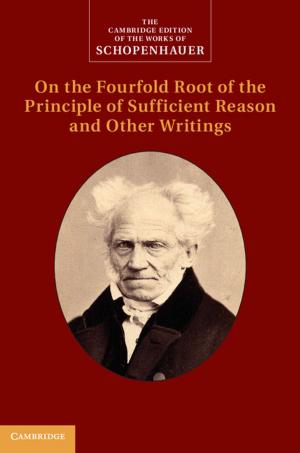Aristotle: Eudemian Ethics
Nonfiction, Religion & Spirituality, Philosophy, Reference, Fiction & Literature, Literary Theory & Criticism| Author: | Brad Inwood, Raphael Woolf | ISBN: | 9781139609647 |
| Publisher: | Cambridge University Press | Publication: | December 6, 2012 |
| Imprint: | Cambridge University Press | Language: | English |
| Author: | Brad Inwood, Raphael Woolf |
| ISBN: | 9781139609647 |
| Publisher: | Cambridge University Press |
| Publication: | December 6, 2012 |
| Imprint: | Cambridge University Press |
| Language: | English |
Aristotle's Eudemian Ethics has been unjustly neglected in comparison with its more famous counterpart the Nicomachean Ethics. This is in large part due to the fact that until recently no complete translation of the work has been available. But the Eudemian Ethics is a masterpiece in its own right, offering valuable insights into Aristotle's ideas on virtue, happiness and the good life. This volume offers a translation by Brad Inwood and Raphael Woolf that is both fluent and exact, and an introduction in which they help the reader to gain a deeper understanding both of the Eudemian Ethics and of its relation to the Nicomachean Ethics and to Aristotle's ethical thought as a whole. The explanatory notes address Aristotle's many references to other works, people and events. The volume will be of interest to students and scholars of the history of ethics, ancient and moral philosophy, and Aristotle studies.
Aristotle's Eudemian Ethics has been unjustly neglected in comparison with its more famous counterpart the Nicomachean Ethics. This is in large part due to the fact that until recently no complete translation of the work has been available. But the Eudemian Ethics is a masterpiece in its own right, offering valuable insights into Aristotle's ideas on virtue, happiness and the good life. This volume offers a translation by Brad Inwood and Raphael Woolf that is both fluent and exact, and an introduction in which they help the reader to gain a deeper understanding both of the Eudemian Ethics and of its relation to the Nicomachean Ethics and to Aristotle's ethical thought as a whole. The explanatory notes address Aristotle's many references to other works, people and events. The volume will be of interest to students and scholars of the history of ethics, ancient and moral philosophy, and Aristotle studies.















